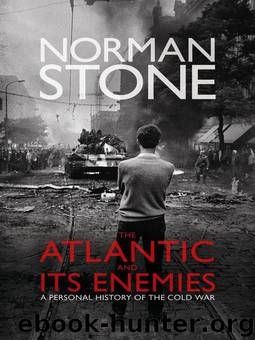The Atlantic and Its Enemies: A Personal History of the Cold War by Norman Stone

Author:Norman Stone
Language: pt
Format: mobi, epub
Tags: Amazon.com, European History, American History, Political Science, History
ISBN: 0465020437
Publisher: Basic Books
Published: 2010-01-01T15:00:00+00:00
18
Europe: The Phoenix Flops
In the early 1950s Moscow had been frightened at the prospect of a Europe headed by a rearmed Germany, and in alliance with the United States. Stalin had tried to bully the Germans; in the early years of Khrushchev there had been fewer crude ploys, but then he too had become a bully, exploding huge experimental bombs and serving ultimatums over Berlin. The West only closed ranks, and NATO became quite sophisticated, with an intelligence network and, in some countries, even a shadowy, underground organization. But by the 1970s matters had changed. Nixon and Kissinger needed to stop the Vietnam War somehow, and had approached Moscow in May 1972 with proposals for détente. They were couched in terms of disarmament - SALT I, the Strategic Arms Limitation Talks - and the American bait was a credit deal over grain shipments, easings of conditions for Soviet visits to the USA, etc. The Americans’ threat was of a deal with China, and the context was a division that had been emerging since Khrushchev’s last years: he had withdrawn help and refused Mao the secrets of the bomb, and Mao responded with a sort of offended nationalism. In 1969-70 there were Chinese-Soviet armed clashes on the river Ussuri, a disputed border, and the Chinese responded to the American opening. But it was not just the Americans who appeared. West Germany launched her own probe, known as Ostpolitik, and she was offering hard-cash concessions. Was this the opening that the Kremlin had been looking for since 1952, and the ‘Stalin Note’ offering German unification in return for neutrality or, as it was called by now, ‘Finlandization’? Germany was after all vulnerable, and official Europe had no teeth.
At the time Europe certainly seemed to the outside world to be a miracle of prosperity, without the concomitant crudities of the United States. However, she remained less than the sum of her parts. The European Community itself (to use the shorthand) was not particularly efficient: quite the contrary, it stumbled along drearily. Its institutions (and its flag) went back to the early fifties, and the Coal and Steel Community: a court, an assembly, and a High Authority to sort out the very technical technicalities of who was to produce what at which price. Jean Monnet himself had become bored with his creation, and its European outcrop was generally used as a parking place for failed politicians whose vanity needed to be salved. The first president of the Commission had been Walter Hallstein, possessed of negative charisma. Later on came heavy-lecturing worthies, the heaviest and longest-lasting a German Widmerpool, Günter Verheugen. It was all desperately uninspiring and even in some ways fraudulent. At the heart of this multinational community was Belgium, subject to the most absurdly provincial nationalisms; even Luxemburg dressed up its dialect, the Dutch equivalent of Liverpudlian, as a national language. In the 1970s, to give the Community some sort of personality and appeal, a parliament was set up, with direct elections. This
Download
The Atlantic and Its Enemies: A Personal History of the Cold War by Norman Stone.epub
This site does not store any files on its server. We only index and link to content provided by other sites. Please contact the content providers to delete copyright contents if any and email us, we'll remove relevant links or contents immediately.
| Africa | Americas |
| Arctic & Antarctica | Asia |
| Australia & Oceania | Europe |
| Middle East | Russia |
| United States | World |
| Ancient Civilizations | Military |
| Historical Study & Educational Resources |
Cecilia; Or, Memoirs of an Heiress — Volume 1 by Fanny Burney(32547)
Cecilia; Or, Memoirs of an Heiress — Volume 2 by Fanny Burney(31945)
Cecilia; Or, Memoirs of an Heiress — Volume 3 by Fanny Burney(31931)
The Secret History by Donna Tartt(19053)
Sapiens: A Brief History of Humankind by Yuval Noah Harari(14368)
Leonardo da Vinci by Walter Isaacson(13316)
The Radium Girls by Kate Moore(12018)
Sapiens by Yuval Noah Harari(5366)
How Democracies Die by Steven Levitsky & Daniel Ziblatt(5215)
The Wind in My Hair by Masih Alinejad(5092)
Homo Deus: A Brief History of Tomorrow by Yuval Noah Harari(4908)
Endurance: Shackleton's Incredible Voyage by Alfred Lansing(4769)
Man's Search for Meaning by Viktor Frankl(4583)
The Silk Roads by Peter Frankopan(4526)
Millionaire: The Philanderer, Gambler, and Duelist Who Invented Modern Finance by Janet Gleeson(4465)
The Rape of Nanking by Iris Chang(4203)
Joan of Arc by Mary Gordon(4101)
The Motorcycle Diaries by Ernesto Che Guevara(4089)
Stalin by Stephen Kotkin(3957)
